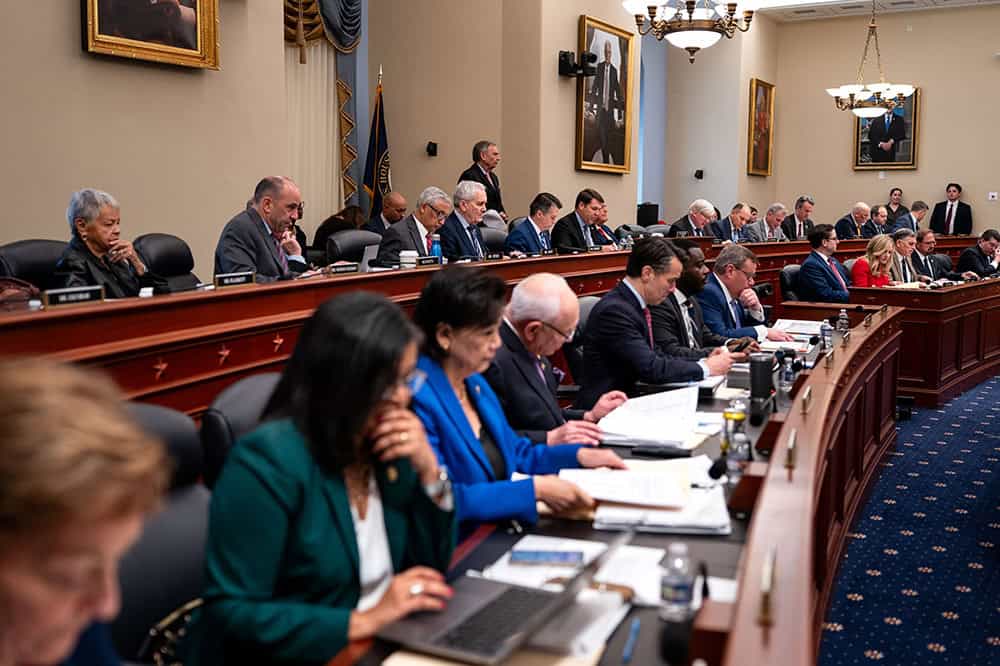New Poll: Voters Want Harris, Trump to Discuss National Debt at September 10 Debate
Overwhelming Bipartisan Calls for Candidates to Answer Questions about their Plans to Ensure 2025 Tax Reform Doesn’t Increase Debt and Avoid a 21% Annual Social Security Cut
Ahead of the upcoming presidential debate, 91% of voters want Vice President Harris and former President Trump to discuss their plans to address America’s $35 trillion and rising national debt. Additionally, 92% of voters agree it’s important that both candidates answer questions about their plans to ensure tax reform doesn’t add to the debt, and 95% want to hear how Harris and Trump would act to avoid the 21% automatic annual Social Security benefit cut if lawmakers don’t touch the program.
More specifically regarding the $4 trillion in tax provisions set to expire next year, 74% of voters seek to support a candidate who will ensure tax reform doesn’t add to the debt, even if it means letting some cuts sunset or finding other savings in the budget. Additionally, two-in-three voters said they will vote for a candidate who offers a plan to prevent the automatic annual Social Security benefit cuts.
More broadly, the U.S. Fiscal Confidence Index in August stayed low at 48 (100 is neutral). The share of voters who believe that the debt should be a top-three priority for the president and Congress increased two points this month (76% agree/18% disagree), including 68% of Democrats, 70% of independents and 88% of Republicans.
“Voters are clearly concerned about the growing national debt, and are calling for answers from the candidates at the September 10 presidential debate,” said Michael A. Peterson, CEO of the nonpartisan Peterson Foundation. “The leaders we elect this fall will face a series of critical fiscal deadlines next year, so Americans deserve a substantive discussion about the candidates’ fiscal plans. With the debt reaching $35 trillion and climbing, automatic cuts to Social Security rapidly approaching, and trillions in tax cuts on next year’s agenda, the stakes are high and American voters are looking to hear some solutions.”
The Peterson Foundation recently released Solutions Initiative 2024, with seven leading think tanks across the ideological spectrum proposing more than 200 policy recommendations to stabilize our debt, address next year’s tax policy deadlines and avoid the automatic Social Security benefit cuts.
The Fiscal Confidence Index measures public opinion about the national debt by asking six questions in three key areas:
- CONCERN: Level of concern and views about the direction of the national debt.
- PRIORITY: How high a priority addressing the debt should be for elected leaders.
- EXPECTATIONS: Expectations about whether the debt situation will get better or worse in the next few years.
The survey results from these three areas are weighted equally and averaged to produce the Fiscal Confidence Index value. The Fiscal Confidence Index, like the Consumer Confidence Index, is indexed on a scale of 0 to 200, with a neutral midpoint of 100. A reading above 100 indicates positive sentiment. A reading below 100 indicates negative sentiment.
Fiscal Confidence Index Key Data Points:
- The August 2024 Fiscal Confidence Index value is 48. (The July value was 48. The June value was 40.)
- The current Fiscal Confidence Index score for CONCERN about the debt is 35, indicating deep concern about the debt. The score for debt as a PRIORITY that leaders must address is 25, indicating that Americans want elected leaders to make addressing long-term debt a high priority. The score for EXPECTATIONS about progress on the debt is 85. The Fiscal Confidence Index is the average of these three sub-category scores.
- For a description of the complete methodology, see the Appendix below.
The Peter G. Peterson Foundation commissioned this poll by the Global Strategy Group and North Star Opinion Research to survey public opinion on the national debt. The online poll surveyed 1,007 registered voters nationwide between August 19 and 21. It has a margin of error of +/- 3.1%.
Detailed poll results can be found online at: www.pgpf.org/FiscalConfidenceIndex.
APPENDIX: Fiscal Confidence Index Methodology and Questions
- The Fiscal Confidence Index is released monthly by the Peter G. Peterson Foundation.
- The Fiscal Confidence Index value is based on six questions in three categories.
- As is done with the Consumer Confidence Index, the first step in calculating the Fiscal Confidence Index is determining the “Relative Value” for each question. This calculation is made by taking the positive response for each question and dividing it by the sum of the positive and negative responses. Each question was asked on a four-point scale, and answers were weighted according to intensity, with the strongest responses counting twice as much as the middle responses (“much” better or worse answers count twice as heavily as “somewhat” better or worse answers).
- The scores for the Concern, Priority, and Expectations categories are determined by averaging the scores derived from the two questions in each category.
- The Fiscal Confidence Index value is converted from the Relative Value to place it on a scale on which 100 indicates equal positive and negative sentiment, while values below 100 indicate negative sentiment and values above 100 indicate positive sentiment.
- The questions are as follows:
###
ABOUT THE PETER G. PETERSON FOUNDATION
The Peter G. Peterson Foundation is a nonprofit, nonpartisan organization that is dedicated to increasing public awareness of the nature and urgency of key fiscal challenges threatening America's future, and to accelerating action on them. To address these challenges successfully, we work to bring Americans together to find and implement sensible, long-term solutions that transcend age, party lines and ideological divides in order to achieve real results. To learn more, please visit www.pgpf.org.
Further Reading
Can a Rescissions Package Help Lawmakers Formalize DOGE Cuts?
There has recently been significant discussion surrounding spending cuts proposed by the Department of Government Efficiency (DOGE), including questions about how and whether cuts identified…
Full Array of Republican Tax Cuts Could Add $9 Trillion to the National Debt
Fully extending the TCJA would cost approximately $5.0 trillion, while other elements of the Republican tax agenda also have large price tags over ten years.
Long-Term Budget Outlook Leaves No Room for Costly Legislation
As lawmakers consider costly legislation to extend expiring tax provisions this year, CBO’s latest projections serve as a warning that our fiscal outlook is already dangerously unsustainable.


